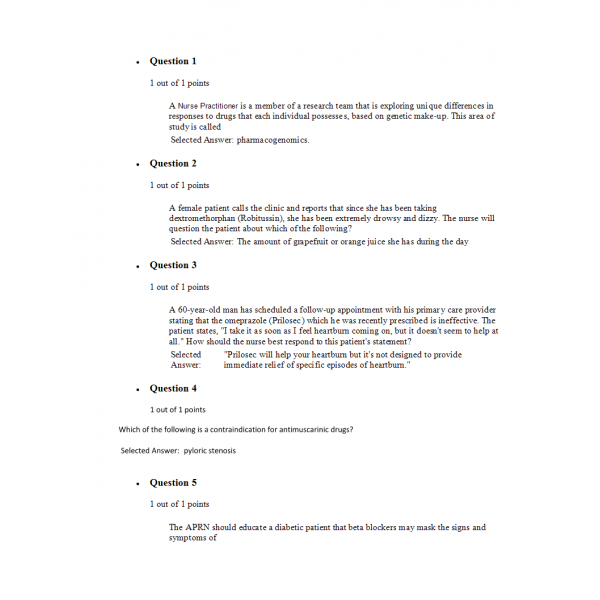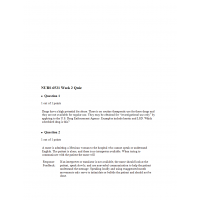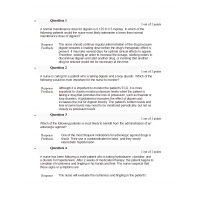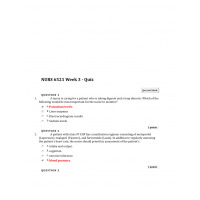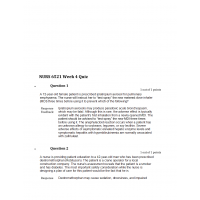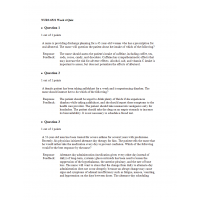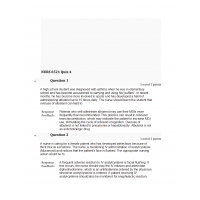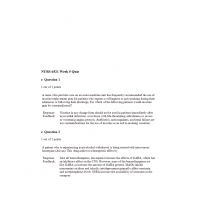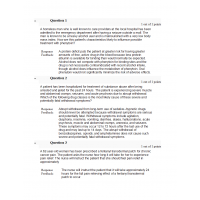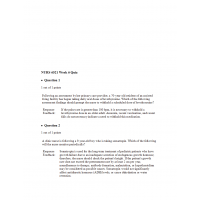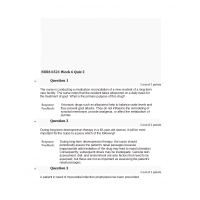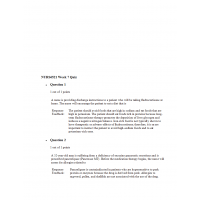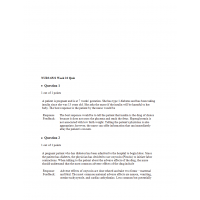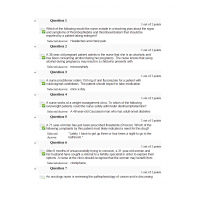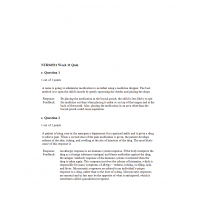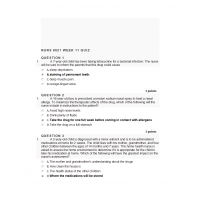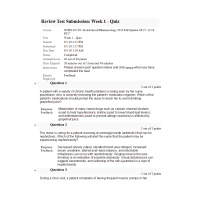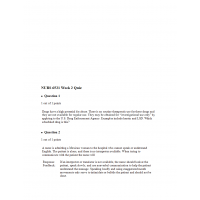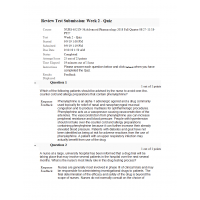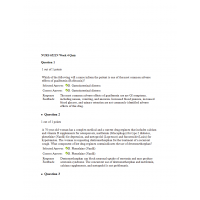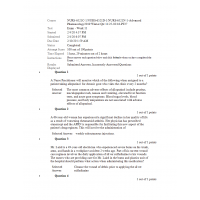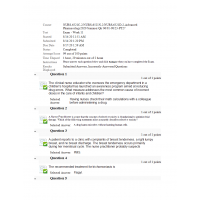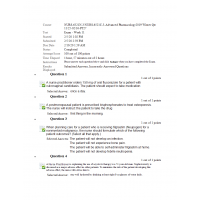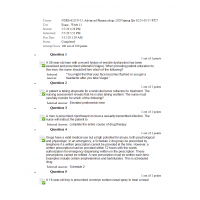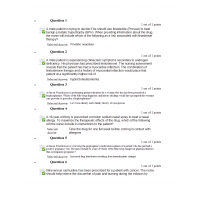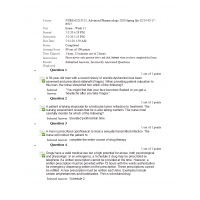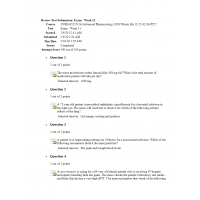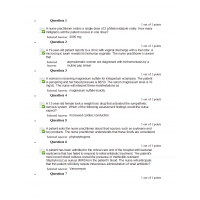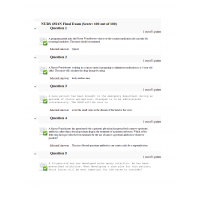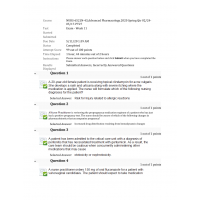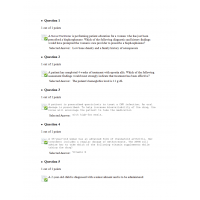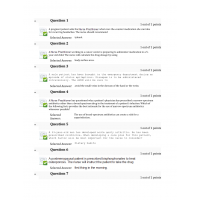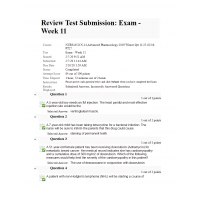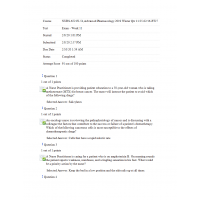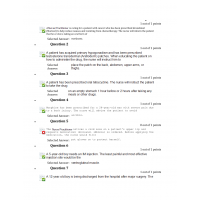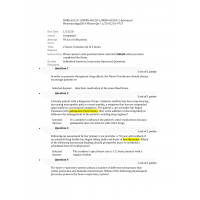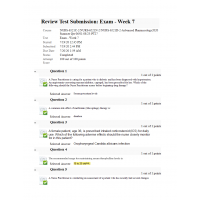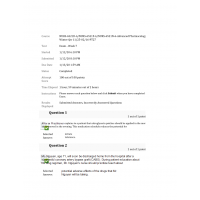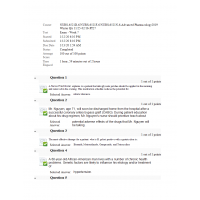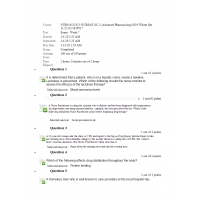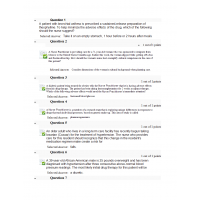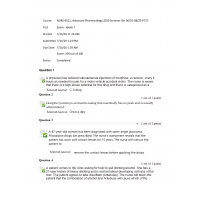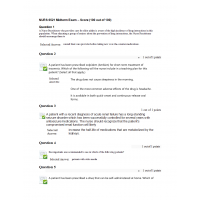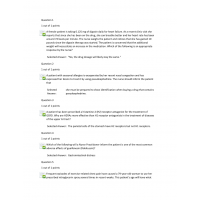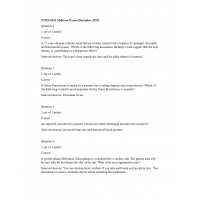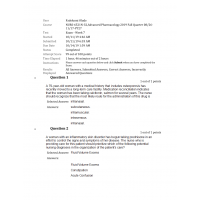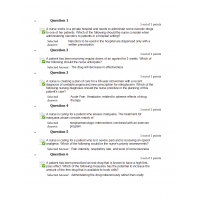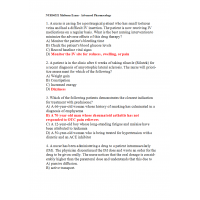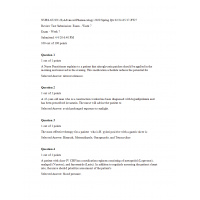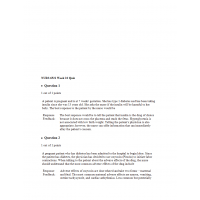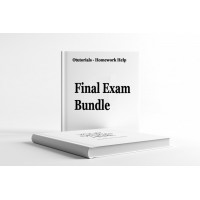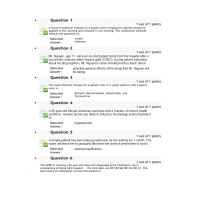NURS 6521N Midterm Exam - 100/100 Points
1. A Nurse Practitioner is a member of a research team that is exploring unique differences in responses to drugs that each individual possesses, based on genetic make-up. This area of study is called
2. A female patient calls the clinic and reports that since she has been taking dextromethorphan (Robitussin), she has been extremely drowsy and dizzy. The nurse will question the patient about which of the following?
3. A 60-year-old man has scheduled a follow-up appointment with his primary care provider stating that the omeprazole (Prilosec) which he was recently prescribed is ineffective. The patient states, "I take it as soon as I feel heartburn coming on, but it doesn't seem to help at all." How should the nurse best respond to this patient's statement?
4. Which of the following is a contraindication for antimuscarinic drugs?
5. The APRN should educate a diabetic patient that beta blockers may mask the signs and symptoms of
6. A male patient is to begin treatment for pneumonia with an albuterol (Ventolin) inhaler. The nurse will advise the patient that he will most likely experience which of the following common adverse effects of the drug?
7. A 20-year-old woman calls the clinic at 5 PM and reports to the Nurse Practitioner that she forgot to take her morning dose of fexofenadine (Allegra). She usually takes her evening dose at 8 PM. She wants to know what she should do. The Nurse Practitioner will instruct her to
8. Typical adverse reactions to oral calcium-channel blockers include:
9. Mesalamine (Asacol) is prescribed for a 22-year-old woman with Crohn disease. The nurse will discuss with the patient the possibility for which of the following adverse effects related to the new drug therapy?
10. The lower respiratory system utilizes a number of different mechanisms that confer protection and maintain homeostasis. Which of the following physiological processes protects the lower respiratory system?
11. A 56-year-old female patient has been admitted to the hospital with chronic muscle spasms and has been prescribed a new medication to treat the spasms. She has a poorly documented allergy to eggs, synthetic clothes, and perfumes. What is the priority action of the nurse to ensure that prescribed medication does not experience an allergic reaction?
12. A Nurse Practitioner explains to a patient that nitroglycerin patches should be applied in the morning and removed in the evening. This medication schedule reduces the potential for
13. A man who smokes one pack of cigarettes daily has been diagnosed with chronic bronchitis. He has been prescribed theophylline by his family doctor. What effect will the patient's smoking status have on the therapeutic use of theophylline?
14. A 45-year-old man who is a construction worker has been diagnosed with hyperlipidemia and has been prescribed lovastatin. The nurse will advise the patient to
15. A patient with bronchial asthma is prescribed a sustained-release preparation of theophylline. To help minimize the adverse effects of the drug, which of the following should the nurse suggest?
16. A Nurse Practitioner is providing patient education to a 35-year-old man who has been prescribed clonidine (Catapres) as part of step 2 antihypertensive therapy. The Nurse Practitioner should anticipate that the drug will be administered
17. Shirley, age 58, has been diabetic for 7 years. Her blood pressure for the last three office visits have been 154/100, 144/94, and 144/90. What would you prescribe today during her routine office visit?
18. A 70-year-old man who enjoys good health began taking low-dose aspirin several months ago based on recommendations that he read in a magazine article. During the man's most recent visit to his care provider, routine blood work was ordered and the results indicated an unprecedented rise in the man's serum creatinine and blood urea nitrogen (BUN) levels. How should a nurse best interpret these findings?
19. Which of the following affects drug distribution throughout the body?
20. A patient has a history of tonic-clonic seizures that have been successfully treated with phenytoin (Dilantin) for several years. Phenytoin achieves a therapeutic effect by
21. A 70-year-old woman has experienced peripheral edema and decreasing stamina in recent months and has sought care from her primary care provider. The patient's subsequent diagnostic workup has resulted in a diagnosis of chronic heart failure. The woman has been prescribed digoxin and the nurse has begun patient education. What should the nurse teach the patient about her new medication?
22. A Nurse Practitioner is providing a patient with a list of drugs as a part of the patient's plan of care. Which of the following drug nomenclatures should the Nurse Practitioner use to list the drugs?
23. A 62-year-old man is admitted to the hospital with a diagnosis of chest pain. He has an order for 0.3 mg of sublingual nitroglycerin prn for chest pain. Which of the following actions should the nurse do first when he complains of chest pain?
24. A 79-year-old woman who takes several medications for a variety of chronic health problems has been prescribed an oral antiplatelet aggregator that is to be taken once daily. The nurse has encouraged the woman to take the pill at the same time of day that she takes some of her other medications. What is the most likely rationale for the nurse's advice?
25. A Native American man who lives a traditional lifestyle is scheduled to have heart surgery. The tribal chief has requested that the tribe's medicine man perform a ritual before the patient goes to surgery. The nurse's response to this request should be
26. Which of the following patients should be advised by the Nurse Practitioner to avoid over-the-counter cold and allergy preparations that contain phenylephrine?
27. What drug class will decrease the facial flushing that occurs with niacin?
28. Which of the following conditions is a contraindication for pioglitazone (Actos).
29. A patient is in the clinic for seasonal allergic rhinitis. Loratadine (Claritin) is prescribed. Which of the following statements will the nurse include when providing patient education concerning this drug?
30. A patient is admitted to the emergency department with severe chest pain. The emergency department physician orders intravenous nitroglycerin 5 mcg/min, titrate dose by 5 mcg/min every 3 to 5 minutes per infusion pump as needed. Before administering the nitroglycerin, the nurse should prioritize which of the following assessments?
31. A patient with class-IV CHF has a medication regimen consisting of metoprolol (Lopressor), enalapril (Vasotec), and furosemide (Lasix). In addition to regularly assessing the patient s heart rate, the nurse should prioritize assessment of the patient's
32. A 72-year-old female patient is prescribed ipratropium aerosol for pulmonary emphysema. The nurse will instruct her to "test spray" the new metered-dose inhaler (MDI) three times before using it to prevent which of the following?
33. A 62-year-old man has been prescribed lovastatin. The Nurse Practitioner will instruct the patient to take the medication
34. A 34-year-old male patient is prescribed methimazole (MMI). The Nurse Practitioner will advise him to report which of the following immediately?
35. A 42-year-old man is being treated for a peptic ulcer with ranitidine (Zantac) taken PO at bedtime. Even though few adverse effects are associated with this drug, one common adverse effect that can be severe is
36. A Nurse Practitioner who provides care in a busy clinic is aware of the high incidence and prevalence of hyperlipidemia and the consequent need for antihyperlipidemics in many patients. Treatment of high cholesterol using statins would be contraindicated in which of the following patients?
37. To minimize the risk of adverse effects of glucagon when given to an unconscious diabetic patient, as the patient regains consciousness, the nurse should
38. A 68-year-old man complains of a chronic, nonproductive cough. He states that he has to have relief, that he has been coughing every 2 to 3 minutes, and he is worn out. Dextromethorphan is prescribed for him. Before he leaves the clinic he asks how long it will take for the medicine to work. The nurse will advise him that he should experience therapeutic effects in
39. A 58-year-old man is admitted to the emergency department. A diagnosis of severe digoxin toxicity is made. Bradycardia is present, and an electrocardiogram (ECG) confirms toxicity. The nurse will administer which of the following drugs?
40. What critical piece of information is missing from the following medication order: Amoxicillin 250 mg every 8 hours?
41. A child is prescribed an inhaled corticosteroid agent to decrease respiratory inflammation related to exposure to an animal. The patient’s parent administers a higher than prescribe dose of the medication for 5 days. What should the APRN monitor the child for?
42. A mother brings her 4-year-old child, who is vomiting and has a temperature of 103°F into the emergency department (ED). The ED physician orders acetaminophen (Tylenol) for the fever. The best form of Tylenol to give the child, considering her presentation, would be
43. Which of the following serves to protect the public by ensuring the purity of a drug and its contents?
44. Which of the following patients is most likely to benefit from the administration of an adrenergic agonist?
45. A 70-year-old man with diabetes mellitus is taking metoprolol (Lopressor) to manage his hypertension. The nurse would be sure to instruct the patient to
46. Following an endoscopy, a 66-year-old man has been diagnosed with a duodenal ulcer resulting from Helicobacter pylori infection. Which of the following medications will likely be used in an attempt to eradicate the patient's H. pylori infection? (Select all that apply.)
47. A Nurse Practitioner is caring for a 70-year-old patient who is taking desmopressin (DDAVP). The patient has a history of cardiovascular disease. The nurse will prioritize the assessment of which of the following?
48. Drugs have a high potential for abuse. There is no routine therapeutic use for these drugs and they are not available for regular use. They may be obtained for "investigational use only" by applying to the U.S. Drug Enforcement Agency. Examples include heroin and LSD. Which scheduled drug is this?
49. A 48-year-old woman who works as an office manager is prescribed metoclopramide (Reglan) for diabetic gastroparesis. The nurse will be sure to assess the patient for
50. The APRN is seeing Mrs. Smith, age 77, who is here for follow up of hypertension, dyslipidemia, and depression. What should you consider during her follow-up?
51. In order to promote therapeutic drug effects, the Nurse Practitioner should always encourage patients to
52. A 49-year-old woman has been diagnosed with myalgia. The physician has recommended aspirin. The patient is concerned that the aspirin will upset her stomach. The nurse will encourage the patient to
53. A patient in need of myocardial infarction prophylaxis has been prescribed sulfinpyrazone for gout. Which of the following will the nurse monitor the patient most closely for?
54. A patient receives 25 units of NPH insulin at 7.AM. At what time of day should the nurse advise the patient to be most alert for a potential hypoglycemic reaction?
55. A 24-year-old factory worker has been prescribed guaifenesin for the first time. Which of the following will be a priority assessment by the nurse before the patient's first dose?
56. Which type of antihistamines are used to inhibit the secretion of gastric acid in patients with gastrointestinal disorders?
57. To maximize the therapeutic effect of diphenoxylate HCl with atropine sulfate, the nurse will instruct the patient to take the medication
58. Which of the following will a Nurse Practitioner inform the patient is one of the most common adverse effects of guaifenesin (Robitussin)?
59. A Nurse Practitioner is caring for a patient who has recently moved from Vermont to south Florida. The patient has been on the same antihypertensive drug for 6 years and has had stable blood pressures and no adverse effects. Since her move, however, she reports "dizzy spells and weakness" and feels that the drug is no longer effective. The Nurse Practitioner suspects that the change in the effectiveness of the drug is related to
60. A patient taking Metformin (Glucophage) is scheduled for a cardiac cath. The patient asks why he can't take his metformin the day of the test. What is the most appropriate reply?
61. Topical inhaled alpha adrenergic blocking agents or nasal vasoconstricting decongestants should not be used chronically (>5 days) because they can cause
62. A 60-year-old African-American man lives with a number of chronic health problems. Genetic factors are likely to influence his etiology and/or treatment of
63. A patient is bothered with nighttime episodes of bronchoconstriction related to asthma. Which of the following medications can be administered to decrease the nighttime episodes and prevent asthma attacks?
64. A patient has recently been prescribed a drug that treats his hypertension by blocking the sympathetic receptors in his sympathetic nervous system. This action is characteristic of
65. A home health Nurse Practitioner is performing a home visit to an elderly client who has early-stage dementia. The Nurse Practitioner observes that some of the client's pill bottles are empty, even though the client is not due for refills for 2 weeks. What nursing diagnosis should the Nurse Practitioner prioritize when planning this client's care?
66. A Nurse Practitioner is caring for a 73-year-old man who is receiving drug therapy. He is beginning to exhibit signs of decline in his renal system, yet his current serum creatinine level is normal. The Nurse Practitioner will base the patient's plan of care on the understanding that there is
67. A male patient is to begin glyburide (Diabeta) for type 2 diabetes. Before the drug therapy begins, a priority action by the nurse will be to assess the patient's
68. A patient has GERD and is taking ranitidine (Zantac). She continues to have gastric discomfort and asks whether she can take an antacid. Which of the following is an appropriate response by the nurse?
69. A Nurse Practitioner is instructing a patient concerning a newly prescribed drug. Which of the following should be included to help improve patient compliance and safety?
70. A Nurse Practitioner is providing discharge planning for a 45-year-old woman who has a prescription for oral albuterol. The Nurse Practitioner will question the patient about her intake of which of the following?
71. A Nurse Practitioner is teaching an older adult patient about polypharmacy. Which of the following statements best describe this term?
72. Decongestants are recommended to use in which of the following patients?
73. During a clinic visit, a patient complains of having frequent muscle cramps in her legs. The nurse's assessment reveals that the patient has been taking over-the-counter laxatives for the past 7 years. The nurse informed the patient that prolonged use of laxatives
74. The APRN is caring for a patient taking a calcium channel blockers for hypertension. The APRN should monitor the patient for what common side effects of this medication?
75. A patient with a recent diagnosis of acute renal failure has a long-standing seizure disorder which has been successfully controlled for several years with antiseizure medications. The nurse should recognize that the patient's compromised renal function will likely
76. A woman with numerous chronic health problems has been diagnosed with a benign gastric ulcer has begun treatment with ranitidine (Zantac). Which of the following teaching points should the nurse provide to this patient?
77. A patient in need of myocardial infarction prophylaxis has been prescribed sulfinpyrazone for gout. Which of the following will the nurse monitor the patient most closely for?
78. A 29-year-old female patient has been prescribed orlistat (Xenical) for morbid obesity. The nurse is providing patient education concerning the drug. An important instruction to the patient would be to
79. A patient is being treated for respiratory infection. He is a recovering alcoholic and has impaired liver function. The nurse will instruct the patient to be especially cautious when taking
80. A patient has been prescribed an oral drug that is known to have a high first-pass effect. Which of the following measures has the potential to increase the amount of the free drug that is available to body cells?
81. A patient has been prescribed rabeprazole (Aciphex). It will be important for the nurse to assess the patient's drug history to determine if the patient is taking which of the following drugs?
82. A Nurse Practitioner who provides care for older adults is aware of the high incidence of drug interactions in this population. When educating a group of seniors about the prevention of drug interactions, the Nurse Practitioner should encourage them to
83. A Nurse Practitioner who provides care in a long-term care facility is documenting a new resident's medication regimen on the resident's intake admission. The Nurse Practitioner is documenting the generic, rather than proprietary, names of the resident's current drugs because
84. A Nurse Practitioner is caring for a patient who is taking digoxin and a loop diuretic. Which of the following would be most important for the Nurse Practitioner to monitor?
85. A 77-year-old patient has a long-standing history of hypertension, a health problem that is being treated with metoprolol and a thiazide diuretic. Before administering the 8 AM dose of these medications, what assessments should the nurse perform and document? (Select all that apply.)
86. A Nurse Practitioner is providing care for a 71-year-old woman who was sponsored to emigrate from Mexico to the United States 6 months ago. Earlier this week, the woman slipped while getting off a bus and fractured her hip. How should the woman's nurse best exemplify cultural competence in the care of this patient?
87. The APRN is prescribing a medication that is known to induce hepatic enzymes. What effect should you anticipate?
88. A patient with a long history of alcohol abuse has been admitted to an acute medical unit with signs and symptoms of hepatic encephalopathy. His current medication orders include QID doses of oral lactulose. What desired outcomes should the nurse associate with this drug order?
89. A Nurse Practitioner has administered a medication to a patient with hypertension. The prescribed drug is supposed to decrease cardiac output. A decrease in cardiac output would most likely
90. The Nurse Practitioner's assessment of a community-dwelling adult suggests that the client may have drug allergies that have not been previously documented. What statement by the client would confirm this?
91. A patient comes to primary clinic for strep throat. A throat swab culture is sent to lab. What information is required for the nurse practitioner to disclose on lab transmittal?
92. A 22 year old patient is transitioning from oral agents to insulin. He will be taking 20 units of Lantus at bedtime and regular insulin before meals. What instructions should the NP provide about the timing and dose of regular insulin?
93. A homeless man who is well known to care providers at the local hospital has been admitted to the emergency department after having a seizure outside a mall. The man is known to be a heavy alcohol user and is malnourished with a very low body mass index. How are this patient's characteristics likely to influence possible treatment with phenytoin?
94. A 39 y/o female is diagnosed with Graves disease. She also has a small goiter =. Her symptoms are not deemed to be severe and propylthiouracil is prescribed. Whare is the most serious potential adverse effect of this medication?
95. A 72-year-old man is prescribed theophylline for symptomatic relief of bronchial asthma. Which of the following findings would alert the nurse to the need for close monitoring?
96. The Nurse Practitioner is treating a patient that takes frequent doses of antacids for his heartburn and is also taking an enteric-coded aspirin. What instructions should be provided to the patient?
97. A clinic Nurse Practitioner has been assigned a 49-year-old female patient who has a history of diabetes. A recent diagnosis of hypertension has been made, and the patient has been prescribed a thiazide diuretic and labetalol. The patient will be scheduled to return to the clinic once a month for the next 6 months. A priority action by the Nurse Practitioner will be to
98. The Family nurse practitioner prescribed losartan 50 mg PO daily for a hypertensive patient. This medication promotes vasodilation by:
99. Which can elevate theophylline levels?
100. A Nurse Practitioner who provides care on an acute medicine unit has frequently recommended the use of nicotine replacement gum for patients who express a willingness to quit smoking during their admission or following their discharge. For which of the following patients would nicotine gum be contraindicated?
| Institution & Term/Date | |
| Term/Date | Walden University |
NURS 6521N Midterm Exam 10 (100 out of 100)
- Product Code: 2020
- Availability: In Stock
-
$30.00
Related Products
Tags: NURS 6521

